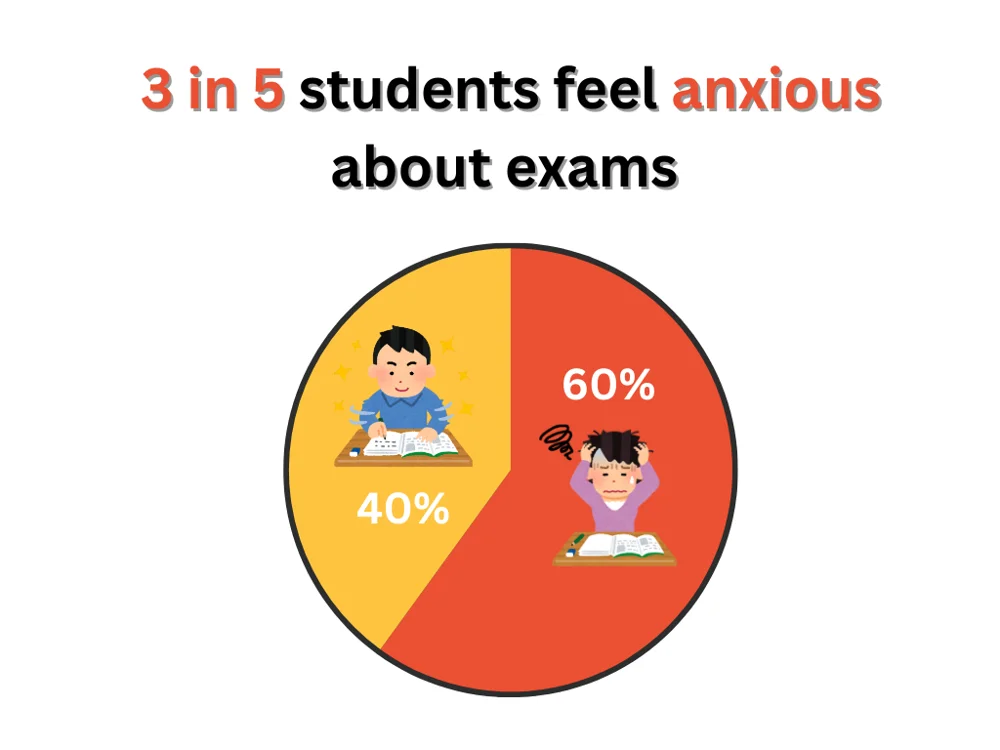In Singapore, academic pressures rank among
the most common stressors for youths aged 10 to 19. Both students and parents face
the demands of heavy study workloads and high-stakes exams, as parents support their
children through these challenges. A 2020 survey by Focus on the
Family found that 7 in 10 children reported feeling “angry,” “worried,” or “sad”
about upcoming exams, with 3 in 5 feeling anxious.
While some stress can be motivating, too much can harm well-being, adversely
affecting physical and mental health, self-esteem, and relationships.
Recognising the sources of this anxiety is essential for building resilience and
balancing academic goals with overall well-being.

Causes of Exam Stress & Anxiety
1. Academic Pressure
With high-stakes exams like the PSLE, O-Levels, and A-Levels, the drive to excel often heightens performance anxiety, leading students to prioritise achievement over well-being. For many, these exams represent more than just grades; they’re seen as key milestones shaping their academic future.
2. Societal & Parental Expectations
High expectations from family and society can create a fear of disappointment and add self-imposed pressure. In competitive settings, constant peer comparisons may intensify feelings of inadequacy, making many feel that academic success defines their worth.
3. Future Career Prospects
Exam results are often seen as stepping stones to career opportunities, adding a layer of long-term stress. Many worry that missing an academic milestone could hamper future prospects, which fuels anxiety and leads to ongoing self-evaluation.
Impact of Exam Stress & Anxiety
Exam stress and anxiety can affect more than just academic performance, and may extend to physical, mental, and social well-being.
How Does Exam Stress Impact Physical Health?
Anxiety about exams may disrupt sleep and cause insomnia, which impacts concentration and memory. Fatigue is also common, as continuous study without breaks can lead to physical exhaustion and lowers energy levels. Stress is also known to trigger headaches, acne breakouts and digestive issues. Over time, chronic stress can weaken the immune system, making illness more likely.
How Does Exam Stress Affect Mental Health?
Exam stress can lead to anxious or low moods, while constant comparison may lower
confidence and self-esteem. Burnout can also set in from
pushing too hard without rest, impacting motivation and energy. The pressure to
perform can also lead to social
withdrawal and isolation, especially at times when support may be most
needed.
For both students and parents, it is helpful to take a step back to recognise these
signs early and can help manage stress before it becomes overwhelming.

How to Manage Exam Stress
Exam stress affects many, yet it can feel overwhelming for some. With the right strategies, students and parents can create a balanced, supportive learning environment that reduces pressure and promotes well-being.
For Students
- Create Structured Revision Plans: Design a study schedule that’s realistic and manageable. Breaking down each subject into smaller tasks can help you feel more in control.
- Practise Healthy Study Habits: Balance is key. Intentionally include short breaks, exercise, and good sleep in your routine. A distraction-free study space can also improve focus. This means putting away mobile phones and other electronic devices so you can focus wholly on your revision.
- Practise Relaxation Techniques: Try deep breathing or mindfulness to help keep nerves in check, whether while studying or during exams. Taking walks to decompress, resting your eyes, and soaking up nature or greenery can also help you recharge.
- Seek Support If Needed: If you feel overwhelmed, consider talking with friends, family, or a counsellor. Remember, your worth goes beyond exam results.

For Parents
- Encourage Open Communication: Talking openly about exam worries helps your child feel support. Gently remind them that while exams matter, they’re just one part of success.
- Set Attainable Expectations: Encouraging a love for learning by appreciating effort as much as grades. Emphasising growth alongside outcomes helps build resilience and reduces academic pressure.
- Model Healthy Stress Management: Practise stress-relief techniques together, such as deep breathing, mindfulness, and regular exercise, to show that well-being is just as important as success. For younger children, paediatric tuina — a gentle traditional Chinese massage — can also be a calming practice to ease exam-related tension.
- Provide Positive Reinforcement: Consider rewarding efforts along with results as it reinforces the value of hard work and determination. Celebrating small achievements can motivate your child to keep striving towards their goals.

Summary: Turning Exam Anxiety Into an Opportunity for Growth
Exam anxiety is a reality in any academic landscape, but it doesn’t have to be overwhelming. With intentional strategies and support, students can approach exams with resilience, balancing their academic goals with personal well-being. Parents, too, play a vital role in creating a positive environment that values growth as much as grades. By working together, students and parents can transform exams into an opportunity for learning, growth, and confidence, setting the stage for success both in and beyond the classroom.
English and Future Success
Research shows that strong English skills go far beyond the classroom, playing a key role in
university1 and career success2. Better English proficiency is not just about grammar and
vocabulary; it provides a crucial stepping stone for achieving life goals.
At Creative Campus, we believe that nurturing strong English skills lays the groundwork for your child’s future success. Our rigorously developed in-house curriculum not only seeks to enhance language proficiency but also fosters critical thinking, creativity, and confidence. Through engaging lessons and dedicated guidance, we equip students with the tools they need to excel academically and beyond. Ready to unlock your child’s full potential? Contact us today to book a trial class and see how we can make a difference!

About Ms Geraldine Chew

DIRECTOR OF PROGRAMMES (SECONDARY AND GENERAL PAPER)
CHIEF EXECUTIVE OFFICER
DIRECTOR OF TEACHER INSTRUCTION
Frequently Asked Questions (FAQ)
Managing exam anxiety can be about finding the right techniques that work for you. Deep breathing and relaxation exercises can help you stay calm, while positive self-talk can also boost confidence. Planning ahead by breaking down your study materials into smaller sections to make it more manageable. If you feel overwhelmed, don’t hesitate to reach out to a friend or family member, as talking it out can often relieve a lot of pressure.
Absolutely, exam anxiety is very common. Many students experience it due to academic pressure and the high stakes around exams. Fortunately, there are ways to manage it – such as time management, breaking down study material, practising breathing techniques, and seeking support. These strategies can help ease pressure and keep you focused.
Intense exam anxiety often stems from high expectations, fear of failure, or past negative experiences with exams. But there are things you can do to ease these feelings. Start by creating a realistic study plan to feel prepared, and use positive self-talk to replace fear with confidence. Practising relaxation techniques and visualising a calm, successful exam experience can also be helpful in managing anxiety.
There are several ways to help calm yourself before an exam. Techniques like deep breathing, mindfulness, and positive visualisation can ease tension. Staying organised with a clear study plan, taking regular breaks, exercising, eating well, and getting enough sleep also support a calm, focused mindset. And if you need extra support, talking with someone you trust can help you feel grounded.
Reducing exam fear starts with solid preparation. Break study materials into smaller, more manageable parts, set realistic goals, and use relaxation techniques like deep breathing or mindfulness to keep anxiety in check. Having supportive friends or family around for encouragement can also make a big difference.
Exam panic is often tied to fear of failure or lack of confidence. But with calming strategies like breathing exercises and solid preparation, you can manage these feelings more effectively and stay focused.
Severe test anxiety can affect focus and memory, making it harder to perform well. However, managing stress with relaxation and preparation techniques can help prevent anxiety from impacting your results.
Good time management, relaxation techniques, taking regular breaks, and practising with past exams are all effective strategies to build confidence and ease stress.
Try breaking up your study sessions into manageable chunks, take regular breaks, and focus on preparation without aiming for perfection. It’s about progress, not pressure.
A balanced study schedule, regular exercise, and good sleep can make a world of difference. Don’t forget to reach out to friends or family if you need a listening ear – they can help ease worries.
In the middle of an exam, take a deep breath, focus on one question at a time, and remind yourself of all the preparation you’ve done. This can help you stay calm and centred.
